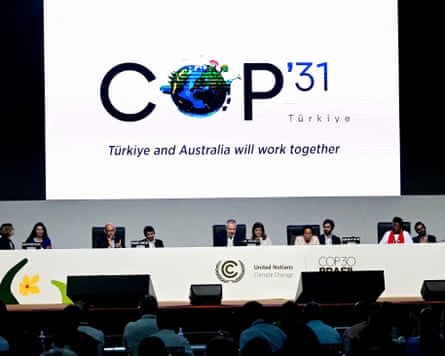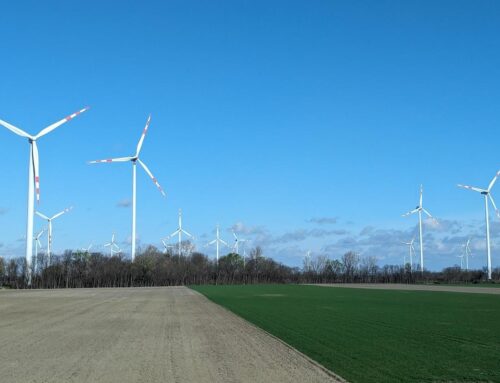Small win at Cop on finance for poor countries overshadowed by failure on fossil fuels
November 23, 2025
“Right now, our people are losing their lives and livelihoods from storms of unprecedented strength which are being powered by warming seas. Our coral reefs, the lifeblood of our islands’ food systems, culture and economies are at a tipping point in dieback. Forest ecosystems are at a tipping point. The window to protect lives and economies is closing.”
While 194 countries argued for more than 12 hours on Friday night over the final details of what should be voluntary and what should be a legally binding commitment as the Cop30 UN climate summit drew to a close, Steven Victor, the environment minister of Palau, tried to remind them of what they were fighting for: people’s lives.
“We are dangerously close to a 1.5C global warming overshoot, driven by the actions of bigger countries,” he said. “Unless we choose the path of course correction right here and now, leaders are dooming our world to disaster.”
The outcome of the Cop30 climate summit will be measured not in the abstractions of “shall”, “should” and “agree to” that are the substance of the more than 150 pages of text gavelled through on the podium, but in lives. Developing countries are looking forward to a tripling of the finance to help them adapt to extreme weather – measures such as regrowing mangrove swamps, erecting flood defences, growing new crops or storing water against drought – but that language is couched in ambiguous terms. It “calls for efforts to at least triple adaptation finance”.
The $120bn (£92bn) a year promised by 2035 must also be compared with the $360bn they are projected to need. That makes a huge difference to countries with overstretched budgets that are already spending on climate defence instead of health and education.
Brandon Wu at Action Aid said: “Ten years from now is an unimaginably long time for communities facing life-threatening impacts now. Unless developed countries are pressed hard, this decision does little but lock in climate injustice for the foreseeable future.”
Going into Cop30, the biggest concern was over the inadequacy of the national climate plans that countries have drawn up. Known as nationally determined contributions (NDCs) under the Paris agreement, these are supposed to be submitted every five years, and should be in line with the commitment to limit global temperature rises to 1.5C above preindustrial levels.
But more than 70 countries – including India and Saudi Arabia – failed to file any NDC, and those that were received were mostly inadequate. Taken together, they would lead to global heating of about 2.5C, far above the 1.5C limit, and represent only about a sixth of the cuts to greenhouse gas emissions that scientists say are necessary.

The response of Cop30 to this dire situation was to agree to further talks about the issue among the countries that wish to join. China, India and others objected to any in-depth discussion of the NDCs at Cop30, or any binding decision to upgrade to make them adequate to the scale of the problem.
More than 80 nations also proposed beginning discussions on a roadmap to “transition away from fossil fuels”, putting into practice a resolution made at Cop28 in 2023. The proposal was mild and regarded as “weak” by some civil society groups, because it called only for countries to start talking about what such a transition might look like, with each setting their own pathway and milestones, and no firm timetable and no coercion.
Laurence Tubiana, an architect of the Paris agreement and chief executive of the European Climate Foundation, said: “Every country has to imagine for itself what policies they want, what role they have to play, and what ambition they have.”
But after bitter fighting with Saudi Arabia and the Arab Group, Russia, some African countries and other countries dependent on fossil fuel consumption, even this proposal was watered down to a voluntary initiative, which the Brazilian presidency will report back on next year.
Johan Rockström, director of the Potsdam Institute for Climate Impact Research and professor of earth system science at the University of Potsdam, said: “The truth is that our only chance of keeping 1.5C within reach is to bend the global curve of emissions downward in 2026 and then reduce emissions by at least 5% a year. [That] requires concrete roadmaps to accelerate the phase-out of fossil fuels and protection of nature. We got neither.”
Civil society groups welcomed a commitment to a “just transition mechanism”. But Mohamed Adow, director of the Power Shift Africa thinktank, said the exclusion, at the insistence of China and Russia, of wording on the exploitation of the critical minerals needed for renewable energy components – which has been accompanied by human rights abuses in many mining regions – was problematic.
“This omission glosses over the human cost of mineral extraction, including the deaths of more than 30 artisanal cobalt miners in the DRC earlier this week,” he told the Guardian. “These miners supply the minerals that power the clean energy boom, and wiping their realities out of the text is both ethically and politically indefensible. We cannot fight for a renewable future without also ensuring we have just and equitable ways to handle the extraction necessary to get there.”
With the key issues of the NDCs and emissions cuts, the transition away from fossil fuels and the adequacy of finance for poor countries all subject to further discussions couched in loopholed terms or put into voluntary initiatives, the outcome leaves a lot for the presidency of Australia, which will host Cop31 in Turkey next year, to deliver.
Asad Rehman, chief executive of Friends of the Earth, said: “The reality and scale of the crisis means that small steps forward aren’t going to be enough. The world needs to start taking giant leaps to cut emissions, fast. I won’t sugar-coat it – the consequences will be terrifying if words aren’t turned into action soon.”
The wording of the key outcome of the Cop30 agreement was the most telling: that countries should aim for “full implementation of NDCs while striving to do better”. Many of those experiencing the full force of the climate crisis today will want to see a great deal more striving at future Cops.
Search
RECENT PRESS RELEASES
Related Post




